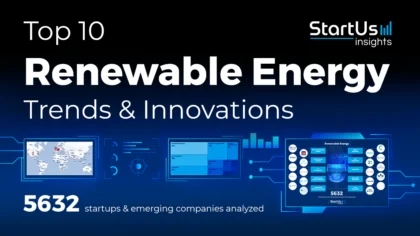Staying ahead of the technology curve means strengthening your competitive advantage. That is why we give you data-driven innovation insights into the energy industry. This time, you get to discover 5 hand-picked mechanical storage solutions.
Global Startup Heat Map highlights 5 Top Mechanical Storage Solutions out of 149
The insights of this data-driven analysis are derived from the Big Data & Artificial Intelligence-powered StartUs Insights Discovery Platform, covering 2.093.000+ startups & scaleups globally. The platform gives you an exhaustive overview of emerging technologies & relevant startups within a specific field in just a few clicks.
The Global Startup Heat Map below reveals the distribution of the 149 exemplary startups & scaleups we analyzed for this research. Further, it highlights 5 energy startups that we hand-picked based on criteria such as founding year, location, funding raised, and more. You get to explore the solutions of these 5 startups & scaleups in this report. For insights on the other 144 mechanical storage solutions, get in touch.
Corre Energy develops Compressed Air Energy Storage Solutions
Renewable sources like wind and solar energy are subject to high fluctuation due to the unpredictable nature of winds and cloud cover. Therefore, these power sources have to deal with the issue of variable energy production. The current method of relying on chemical batteries is inefficient, expensive, and leaves a carbon footprint. This is why startups are developing energy storage solutions, such as compressed air energy systems, that overcome the drawbacks of batteries.
Corre Energy is a Maltese startup that builds and operates grid-scale compressed air energy storage systems. During peak production intervals, the excess energy powers air compressors that fill storage systems in underground salt caverns. Later, in periods of low energy production, the system releases this compressed air through turbines to generate electricity, avoiding the need for a fossil fuel-powered backup. The Corres setup uses green hydrogen to power all other auxiliary devices, making it carbon neutral.
Gerotor offers a Flywheel Storage System
The current grid-scale energy storage systems like lithium-ion batteries make the net carbon footprint of eco-friendly energy sources positive. This is because of the manufacturing methods and toxic byproducts of these batteries. This is why energy startups are focusing on new, highly efficient, low-cost, and clean alternatives to lithium-ion batteries. For instance, flywheel energy storage stores excess energy as rotational kinetic energy. But conventional flywheel systems are not energy-efficient. So, startups and scaleups are developing low-loss flywheel energy storage systems.
German startup Gerotor develops efficient and sustainable energy storage solutions for industrial applications. The startup’s High Power System (HPS) is based on flywheel storage technology and offers high power density, high reliability, a large number of charge cycles, and consistent performance during its lifetime. The flywheel solution is compact and the startup’s unique design using standard components and automotive product design principles enables scalability and serial reproducibility. High Power Block (HPB) is Gerotor’s swarm intelligence solution that connects HPS modules together. This enables active energy management of industrial grids as per the capacity requirements.
Oceanus provides Pumped Hydropower Storage
Hydroelectric power has the potential to become one of the most reliable sources of clean energy due to its high energy density and conversion efficiency. However, most hydroelectric projects are confined to dams built across rivers. Energy startups are developing pumped hydropower technologies that widen the scope of hydroelectric power. Such solutions also help to create water reserves in addition to storing clean energy. Further developments allow more utilization of ocean water, thus reducing the dependence on freshwater resources.
Oceanus is a Chilean startup that develops and executes pumped hydropower projects. The Integrated Pumped Hydro Reverse Osmosis Clean Energy System (IPHROCES), the startup’s pumped hydropower solution, integrates a reverse osmosis plant for desalination with energy storage. The solution stores energy surplus from renewable sources by utilizing it to pump seawater into an upper storage reservoir. As per requirement, this water is released downhill to drive turbines, providing electricity to the grid. The water is also discharged via the IPHROCES systems to feed the desalination plant, which does not need additional electricity due to the hydraulic pressure.
Cheesecake Energy provides Containerized Compressed Air Energy Storage
The intermittent nature of renewable energy sources like solar and wind energy poses challenges to EV charging, microgrids, and industrial energy setups. Energy startups are working on storage devices that help stabilize renewable energy sources at the consumer end and decentralize energy storage. However, scaling down the existing energy storage solutions that utility companies use on the grid scale is not economically viable. Hence, innovations in energy storage devices focus on cost-effective miniaturization.
Cheesecake Energy is a British startup that develops medium to long-duration energy storage solutions in a modular, containerized package. eTanker, the startup’s energy storage system, stores energy in the form of heat and pressurized air. The system’s components have high durability and operate without degradation of efficiency during their lifespan. The startup modifies ex-service truck engines into zero-emission electrical power conversion machines.
Energy Vault develops Gravity-based Energy Storage
The conventional methods of energy storage-most notably chemical batteries degrade during their lifetime. This drastically lowers the efficiency of batteries towards the end of their lifetime. Startups and scaleups develop mechanical energy storage devices that operate with a stable efficiency while in commission. Gravitational mass energy storage is one such sustainable alternative that promises consistent performance.
Energy Vault is a Swiss startup that develops gravity and kinetic energy-based, long-duration energy storage solutions. The startup’s EV1 tower stores energy by lifting mobile masses into a tower. When required, the controlled decline of the weight generates kinetic energy, which a generator converts to electricity and dispatches to the grid. The solution uses industrial waste materials for manufacturing its mobile masses and structures, avoiding the dependence on non-renewable sources. The EV1 Tower integrates with existing renewable energy infrastructure, thus lowering the capital expenditures (CapEx) requirement for utility companies.
Discover more Energy startups
Energy startups such as the examples highlighted in this report focus on thermal energy storage, carbon capture & storage, and hydrogen storage. While all of these technologies play a major role in advancing the energy industry, they only represent the tip of the iceberg. To explore more energy technologies, simply get in touch to let us look into your areas of interest. For a more general overview, you can download our free Energy Innovation Report to save your time and improve strategic decision-making.


![Dive into the Top 10 Energy Industry Trends and Innovations [2025]](https://www.startus-insights.com/wp-content/uploads/2025/03/Energy-Trend-SharedImg-StartUs-Insights-noresize-420x236.webp)






